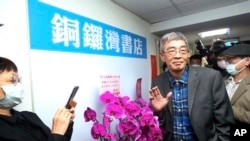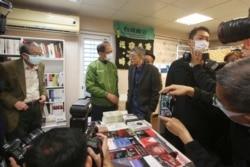Taiwanese people jammed the narrow aisles inside Lam Wing-kee’s Causeway Bay Books when it opened here on Saturday and a lot wanted to chat with the Hong Kong-born vendor who fled to Taiwan last year following an arrest at the hands of China over titles that offended the Communist leadership.
The more than 1,000 people who packed his downtown Taipei store over the first hours of business support the idea of his reopening in Taiwan, which has full free speech, and resent China for killing his operation of Causeway Way Books in the Chinese territory Hong Kong. Lam was one of five Hong Kong sellers who disappeared in 2015 over book content.
Lam was jailed in mainland China but allowed to return to Hong Kong and retrieve his computer as part of the case against his store. He never went back to the mainland.
But most Taiwanese are considered unlikely to buy books about Chinese politics and leaders – the type that incited government anger over the Hong Kong store – since they normally read other types of material and increasingly find it online rather than in bound volumes.
“Actually, a lot of people who are coming here support Hong Kong,” said Paul Lin, a writer and friend of Lam who showed for the store’s opening day. “One thing is to show that Taiwan is the paragon of the ethnic Chinese world for freedom of speech and freedom of publication, which is tough in other places.”
Lam runs his store now from a single-room 10th-floor office in a chic young people’s shopping district sprinkled with cafes, hair salons and other booksellers. Customers who showed Saturday said they wanted to support Lam after learning about the sometimes violent protests in Hong Kong last year against rule by China.
They will buy books to show that support, said Saturday book browser Ho Liang-xuan, a 22-year-old university student in Taiwan. “I believe most Taiwanese people care a lot about the Hong Kong protests and will think they must help Hong Kong,” Ho said. “Hong Kong’s entire existence isn’t so easy now.”
China claims sovereignty over Taiwan as well, though the two are separately ruled. Most Taiwanese surveyed by the government in Taipei last year said they oppose unification with China, and officials in Taiwan spoke openly in favor of Hong Kong’s protesters.
Taiwanese, particularly youth, probably won’t buy a lot of volumes on China, said Alexander Huang, strategic studies professor at Tamkang University in Taiwan.
A Taiwan National Central Library study in 2018 showed only one China title among young people’s top 10 favorite political books and it was focused largely on travel. Taiwanese look up to Japan and parts of the West, a possible reason for their choices of literature. The popularity of e-books had risen 30% in 2018, the library study noted.
“Young people literally don’t read books anymore, “Huang said.
Lam picked his Taipei store’s 10,000 titles with a variety of local readers in mind.
“These books are written essentially from different viewpoints so you can’t say they’re all about mainland China,” Lam said Saturday.
Prominent China-related titles being sold now include Chinese Nobel-prize winning dissident Liu Xiaobo’s book on the June 4, 1989 Tiananmen Square massacre and a release by Chinese dissident writer Yu Jie. Lam decided against selling a book on the private life of Chinese leaders, one that stirred trouble last year, for lack of “evidence” to back the author’s claims.
Lam’s shelves now display a book on Stalin by Russian historian Oleg Khlevniuk and the post-Holocaust title Eichmann in Jerusalem: A Report on the Banality of Evil.
The very youngest readers will find an illustrated volume of maps from ancient China, a math tutorial paperback and Where’s Spot, a picture book that follows a dog that hides in parts of its owner’s home.
“I’m glad to see the people here today are young people since young people tend to rely on the internet,” Lin said. He planned to buy the Yu Jie book because it’s aligned with his own views on China.
Reopening the store took perseverance. Lam raised the money for it through about $200,000 in crowdfunding. Days before the opening someone splashed him with red paint, Lam said. Police helped ensure safety on opening day, he said.
Lam was jailed in mainland China but allowed to return to Hong Kong and retrieve his computer as part of the case against his store. He never went back. He felt compelled to leave Hong Kong last year as the territory’s government began considering an extradition law that could have forced his return to the mainland. The proposed law touched off Hong Kong’s mass protests.





